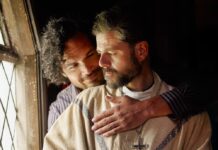If Auckland is your stomping ground, chances are you’ve come across the parpin’ tunes of Hopetoun Brown.
Tim Stewart describes the band as a “duo fuelled only by bass, clarinet, vocals and whatever my body can make using the floor and percussion I’ve got” – which roughly translates to blues, soul and stomp.
Together, he and Nick Atkinson have shaken up venues around the country, been nominated for the Taite Prize and shared the stage with a selection of musical maestros, including Marlon Williams, The Violent Femmes and Weird Together.
While the name seems like an ode to Auckland Central, it was more situational than devotion – Tim was living in Brown St and Nick was living in Hopetoun St at the time.
It’s a name that rolls off the tongue with such ease it would fit right into a 1970s funk show lineup – it’s also one that Joe Lonie, the bass player from Supergroove, swears that he came up with. Tim’s not fussed who takes the credit – but maybe the geography deserves a bit of the accolade.
The guys are no strangers to the industry – they spent years playing in the horn section of Supergroove – in fact, they were founding members.
“We like a lot of groove-based music, a lot of hip-hop, a lot of funk and blues and all that rootsy stuff, so it seemed to really work and we sort of never looked back,” says Tim.
He didn’t come from a musical family, his parents didn’t play an instrument and neither did his sister – although there was that one great-grandfather who was a cornet player Tim found out much later in life.
He says his is the typical story of an eight or nine-year-old who has parents that make them learn an instrument.
“I wasn’t really that serious about it at all until Karl from Supergroove was like ‘you’ve gotta learn an instrument because we’re gonna have a band with your sister and go to Europe and busk.’”
So, needing to come up with an instrument he floated around the idea of learning the guitar… Karl had other ideas for the direction of the band though and the guitar, it was decided, was simply just too boring.
Next on his list was the trumpet; he really liked A Message to You, Rudy by The Specials and he knew that there was a trumpet floating around at school so it seemed like an obvious choice.
It turns out it’s actually a trombone on The Specials track, “I spent years slaving away learning an instrument that wasn’t on the record… I now since have a trombone.”
The day he bought a trumpet, Karl dragged him back to his house and taught him the blues progression. A band was born and Nick was drafted by Karl as the sax player.
“It’s a pretty irrational group to decide to be a band,” says Tim, “A trombone, a saxophone and a harmonica.”
“Now you’ve got this group of buddies and you’re kind of nuts really.”
He laughs, telling me “You know, we would hang out on train tracks over by the museum, walk around all day down in the old industrial waterfront and pretend to be drifters.
“It’s fun, it’s your gang, it’s your sports team, the thing that you identify with when you’re about 14 – it means a lot.”
Music, he says, just sort of became his life and it’s all he thinks about these days – that next bass line, groove or lyric.
It’s got to have rhythm and groove, even if it’s a slow ballad – it’s got to have those elements. “I need something to hold on to.
“I find it hard to listen to music where people have put no effort into that,” his confession is more matter of fact than anything – Tim knows what he likes.
“It might be pretty, and it might have lots of other good things about it but it will be really hard for me to hold onto that for long if it doesn’t have some groove impetus, something that makes your finger tap or your butt shake.”
While live shows offer up a visceral experience where you can grab people and get them into your space, Tim says equally as important is working in the studio.
“I love the complete and unbridled freedom you have in there – that you can do anything, particularly in that little room where I’ve got drums and bass, synthesiser and all of the brass.
“I can just stack and layer that until I’ve got a 1970’s cop show soundtrack or whatever the hell I want to make.
The recording studio, he says, is very freeing.
He’s not trying to do things by the book either, in fact, A Dirty Shame is Tim’s song in response to the assimilation of gay culture – in case you’re wondering, he’s not a fan, growllin’ “You can keep your melting pot, I’ll keep my dirty shame”.
You can catch Hopetoun Brown at WOMAD, 16 – 18 March at the TSB Bowl of Brooklands, New Plymouth. Get your tickets from womad.co.nz.


















